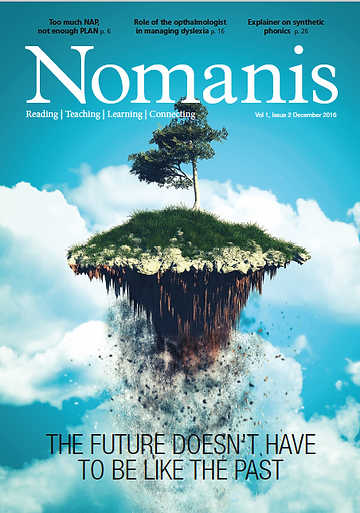
Issue 2, December 2016
The need for effective early reading instruction in schools is a theme carried through several of the articles in the second edition of Nomanis, published in December 2016. We cover the role of the ophthalmologist in the management of dyslexia and the overselling of brain research to support educational initiatives. The edition also includes a letter from a parent questioning author Mem Fox's somewhat controversial views on helping children learn to read, and an interview with an outstanding recent teaching graduate providing insight into what good instruction for trainee teachers actually looks like.
You can view a digital edition of Nomanis here, download a PDF of the whole edition here (13Mb), or download the following individual articles below:
• Too much NAP, not enough PLAN – Implications of the latest NAPLAN results: Jennifer Buckingham
• A letter to the Shadow Minister for Education, Tanya Plibersek: Coral Kemp
• The future doesn't have to be like the past: Jim Rose
• Building the fence: Kevin and Robyn Wheldall
• Five common misconceptions about learning: Greg Ashman
• So much talk about 'the brain' in education is meaningless: Jared Cooney Horvath and Gregory Donoghue
• Role of the ophthalmologist in the management of dyslexia (specific learning difficulties): Frank Martin, Lindley Leonard, Craig Donaldson, James Elder, Glen Gole and Geoffrey Lam
• At the coalface with Mark McClements: Simmone Pogorzelski
• What would you have had me do, Mem?: Jackie Nieuwenhuizen
• Five minutes of phonics to lift child literacy levels: Jennifer Buckingham
• Explainer – What does the term 'synthetic phonics' really mean?: Kevin Wheldall, Pamela Snow and Linda Graham
We'd very much like to hear from you, our readers; let us know what you liked or did not like, what you agreed with or with what you disagreed, or send us an article about something that is of concern to you. All contributions gratefully received.
We hope you enjoy this edition.